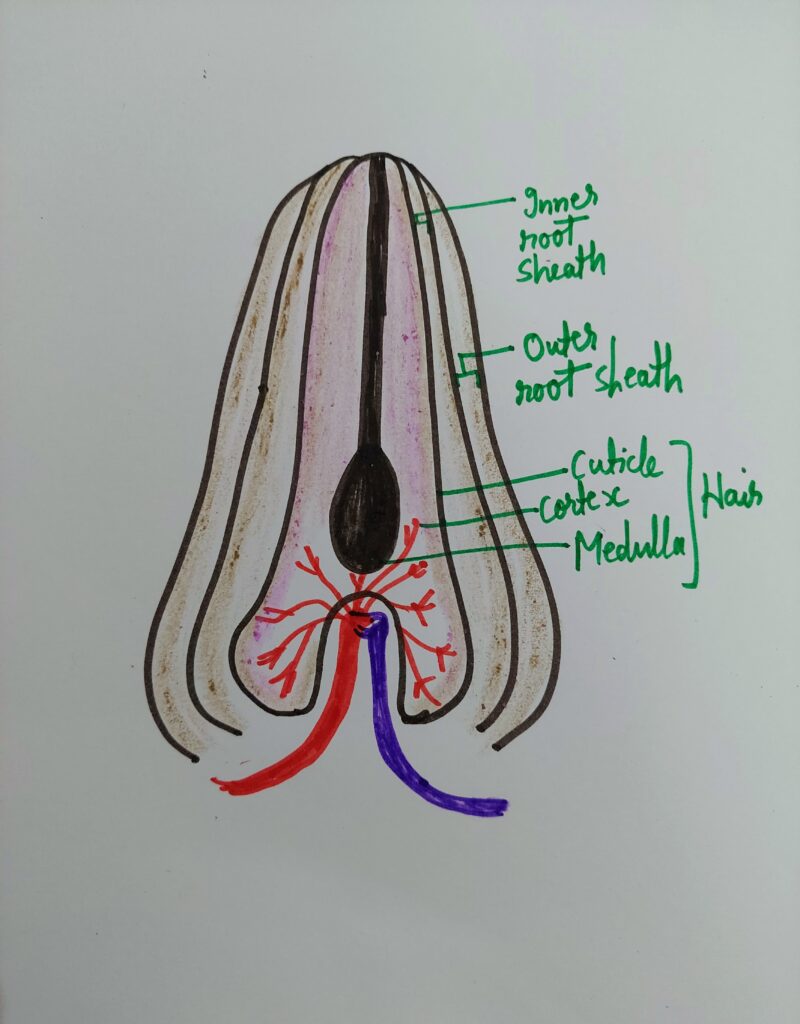HOW TO TAKE CARE OF HAIR?
- BY DR. AK RANA
Health of hair is directly linked to health of body. Our body doesn’t consider hair to be that much important, that’s why in the case of stress or lack of nutrients; hairs suffer the most.
All the nutrients are sent to essential organs like brain, heart, kidney etc.
You must have observed falling of hairs increases when you are under stress for many days or after viral fever or exams or due to neglection.
Hairs need to be taken care of appropriately for them to grow and shine.
HAIR
Layers of hair (from within outwards)
- Hair shaft
- Inner root sheath
- Outer root sheath
- Glassy membrane
- Connective tissue sheath
LAYERS OF HAIR FOLLICLE

HAIR CYCLE
Hair goes through different stages-
- Anagen (growth phase) – 86% of hairs are present in this phase.
Duration – 3 years
- Catagen (involution/ destruction phase)
1% of hairs are in this phase
Duration – 3 weeks
- Telogen (resting phase)
13% of hairs are present in this phase
Duration – 3 months
Hairs grow at the rate of 1 cm per month.
Effluvium – Loss of hair
ANAGEN EFFLUVIUM
In case of chemotherapy and radiotherapy, hair growth gets arrested in anagen phase.
This is called dystrophic anagen which further lead to hair loss.
TELOGEN EFFLUVIUM
Have you ever felt that your hairs are falling too much, all of sudden.
Now when you will look back 3 months ago, you will remember.
Yes! At that time you had a viral fever/malaria / typhoid / COVID-19.
It can also happen after surgical procedures or a major stress.
Even in post-pregnancy, diffuse falling of hairs is seen.
It is because, usually only 13% hairs are in telogen phase; but in case of major stress there is premature entry of hair into the telogen phase.
After premature entering into telogen phase, 3 months later hair loss occurs.
If you are losing hairs because of this, there is nothing to worry about. Though it will take time, but slowly the hair cycle will return to normal.
Pay special attention to your diet, eat healthy foods, and sleep on time along with yoga and exercises.
ANDROGENETIC ALOPECIA
Usually seen in men and depends on genetic factors and androgens.
Testosterone gets converted to dihydrotestosterone, which causes thinning of hair and thereby hair loss.
TAKING CARE OF HAIRS
- Undernutrition is detrimental for the health of hairs.
To be fully healthy to keep our hairs healthy is the goal. A balanced diet full of carbohydrate, protein, vitamins and minerals should be taken.
Low hemoglobin due to deficiency of iron leads to anemia, causing weakening and later on loss of hairs.
Take iron supplements if needed after consulting your doctor and along with take iron rich foods including green leafy vegetables.
In vitamins- take vitamin B, C and D specially.
Proteins should also be taken adequately; in vegetarian diet proteins usually are low in quantity. So, take pulses, paneer, chickpea, green peas, etc regularly.
- Eat seasonal fruits and vegetables. Green leafy vegetables should be made part of food plan.
- Drink lots of water.
Drinking good amount of water, keeps good blood circulation. Besides this, keeps the kidney healthy. Helps to clear out the toxins, out of the body.
- Putting adequate amount of oil in hairs.
Not too much and not too less.
It’s not right to keep oil in hairs for days or to not put oil at all.
- Washing hairs
Hairs should be generally washed after putting some oil in it.
Yes, it’s true that our hairs and scalp have natural oils but again and again washing hairs without any protective covering of oil can lead to wiping up of our essential natural oils. It makes hairs dry, friable and thus weak.
On the other hand, keeping oil in head for days together, can lead to capturing of dirt and perfect humid space for dandruff.
It’s required to wash hairs at regular intervals which you can pre-decide.
Washing hairs at least twice in a week is required, which can increase on the basis of the weather/climate of place or the person’s choice.
Still, keep in mind both of the things. Over or under washing can be bad for the health of our hairs.
- Stress
It’s something that cannot always be avoided. Still, it should not become everyday partner. Try to remove the cause or to decrease it or protect yourself with yoga, exercise and meditation.
Stress can come and go but health is permanent and should never be avoided.
- Take a good 6-8 hours of sleep.
Sleep is rejuvenating therapy for all parts of our body including hairs.
If possible also take a good nap in afternoon.
- Do regular yoga and exercises.
It helps balance all sorts of chemicals, neurotransmitters and hormones in our body.
- Try to avoid harmful dyes and color.
Hair straightners and hair dryers as much as you can.
Remember, anything done after full study and in regulation is fine but using hair dryers and straightners like everyday will not be called a wise choice.
- When you wash or dry your hairs don’t be too harsh on your hairs.
Wash and dry them quiet gently.
- Use anti- dandruff shampoo when there is need and avoid scratching the scalp too much because of dandruff.
Consult a specialist if your hairs are too itchy or falling too much.
Your hairs strength and shine comes from inside, for it you also need to be strong from the core.
Eat healthy and live healthy.
Beauty comes from within.
If you have any questions or you want to tell your story/views, kindly share in comments.
You can also contact our team at halleysclinic@gmail.com
ALSO READ HOW TO KEEP HEART HEALTHY?
ALSO READ HOW DO WE SLEEP?









I am really inspired together with your writing skills as well as with the structure in your blog. Is that this a paid topic or did you customize it your self? Anyway keep up the excellent high quality writing, it’s rare to look a nice blog like this one today!
Here to join conversations, share thoughts, and pick up new insights as I go.
I like hearing diverse viewpoints and contributing whenever I can. Happy to hear fresh thoughts and meeting like-minded people.
Here is my website-AutoMisto24
https://automisto24.com.ua/